Source: Ahmed Afzaal Inquirer, Educator, Bibliophile, Concerned Earthling
Tous les liens google sur ce texte...
Requiem for the American Dream : Le cercle vicieux de la concentration des richesses et du pouvoir
The ninth principle of the concentration of wealth and power deals with one of Chomsky’s abiding themes, i.e., the mechanisms through which thought control—or the manufacturing of consent—takes place in a liberal democracy.
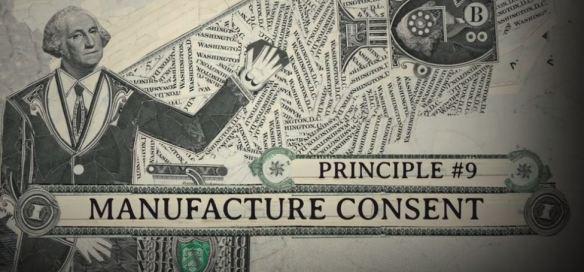
Chomsky begins by referring to the origins of the public relations and advertising industries at the turn of the twentieth-century:
The public relations industry, the advertising industry, which is dedicated to creating consumers, it’s a phenomenon that developed in the freest countries, in Britain and the United States, and the reason is pretty clear. It became clear by, say, a century ago, that it was not going to be so easy to control the population by force. Too much freedom had been won. Labor organizing, parliamentary labor parties in many countries, women starting to get the franchise, and so on. So, you had to have other means of controlling people. And it was understood and expressed that you have to control them by control of beliefs and attitudes.
Here, Chomsky is answering a critical question: How does the ruling class maintain its control over the population despite the growing consciousness of civil rights and democratic freedoms? During most of civilized history, elite control of the population was maintained largely through the threat and use of organized violence, and to a lesser extent through religious legitimation of the status quo. Every now and then popular rebellions did occur, but they tended to be ruthlessly crushed by the rulers. From the rise of cities to the beginning of the industrial age, violent force remained the main instrument employed by the ruling classes for keeping the masses obedient and for discouraging any fantasies of rebellion against the established order. This dynamic started to change, however, in the wake of the Glorious Revolution (1688) and the French Revolution (1789). As the ideals of human equality and popular sovereignty started to gain wide acceptance, it became increasingly difficult for the elite to rule through force alone. To the extent that violence or the threat of violence were no longer effective in controlling the masses, it became imperative for them to solicit and gain the support and consent of the masses—or risk losing their legitimacy.
In the United States, a number of key freedoms and rights were won during the Progressive Era—developments that were correctly seen by the elites as threats to their economic and political interests. As a result, a need arose at the beginning of the twentieth-century for managing the perceptions of the population in increasingly subtle and sophisticated ways. The public relations and advertising industries came into being at that time precisely to meet that need, and just in time for President Woodrow Wilson to use them for his own project: gaining public support for American entry in the First World War. The aim of these new industries and associated professions was to apply the latest scientific discoveries concerning human motivation and behavior in the service of the rich and powerful; this was to be achieved through using the print media and other forms of mass communication for shaping popular beliefs and attitudes.
Chomsky has previously discussed the political aspects of this phenomenon in his 1988 Massey lectures, subsequently published as Necessary Illusions: Thought Control in Democratic Societies (1989). In the preface to that book, Chomsky explains that a major contradiction is inherent within the structure of capitalist democracies: Capitalism tends to concentrate power in the hands of the wealthy, while democracy requires that power be widely distributed among the population. For Chomsky, the manufacturing of consent through mass media is the most common way in which the ruling elite have typically sought to overcome that contradiction:
In capitalist democracies there is a certain tension with regard to the locus of power. In a democracy the people rule, in principle. But decision-making power over central areas of life resides in private hands, with large-scale effects throughout the social order. One way to resolve the tension would be to extend the democratic system to investment, the organization of work, and so on. That would constitute a major social revolution, which, in my view at least, would consummate the political revolutions of an earlier era and realize some of the libertarian principles on which they were partly based. Or the tension could be resolved, and sometimes is, by forcefully eliminating public interference with state and private power. In the advanced industrial societies the problem is typically approached by a variety of measures to deprive democratic political structures of substantive content, while leaving them formally intact. A large part of this task is assumed by ideological institutions that channel thought and attitudes within acceptable bounds, deflecting any potential challenge to established privilege and authority before it can take form and gather strength.
To paraphrase, a society that claims to follow both capitalism and democracy at the same time, such as the United States, must somehow deal with the following tension: on the one hand, democracy requires that people enjoy the right to participate in any decision that affects them, while, on the other hand, capitalismrequires that private owners of capital enjoy the right to manage their capital without any interference. This means that the requirements of democracy are incompatible with the requirements of capitalism, making it impossible for both of them to coexist in the same society. According to Chomsky, this tension between democracy and capitalism can be resolved in one of the three ways: (1) by extending the principle of democracy to the realm of capital; (2) by using violent force to obtain people’s compliance; or (3) by using the mass media and institutions of socialization to shape public opinion in favor of the established order. The first option violates the basic principle of capitalism and will be unacceptable to the elite classes, while the second option foregoes any pretense to democracy and will be unacceptable to the masses. The third option is what is actually practiced in liberal democracies: it involves maintaining a facade of democratic institutions to placate the population while allowing the elites to keep their power and privilege. Such an arrangement inevitably requires extensive ideological management of the population, which is basically propaganda without any overt use of force, threats, or other authoritarian tactics. Propaganda has replaced violence.
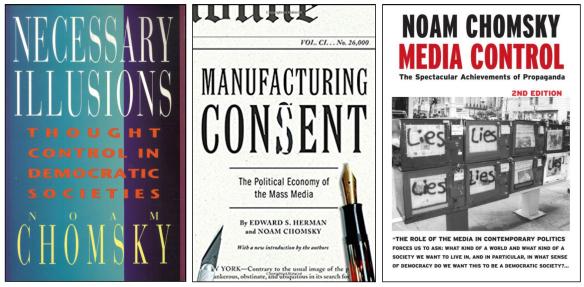
Much of the ideological management of the population—also known as “thought control” (Chomsky’s phrase) or “manufacture of consent” (Walter Lippmann’s phrase)—takes place through news and political commentary in the mass media, a topic that Chomsky has discussed in detail in Manufacturing Consent: The Political Economy of the Mass Media, which he co-authored with Edward S. Herman. In Requiem, Chomsky focuses on the role of advertising and public relations industries. He points out that the contemporary culture of relentless consumption is by no means a manifestation of natural human desires; it is, rather, the result of sophisticated manipulation of people’s feelings at a mass scale.
One of the best ways to control people in terms of attitudes is what the great political economist Thorstein Veblen called “fabricating consumers.” If you can fabricate wants, make obtaining things that are just about within your reach the essence of life, they’re going to be trapped into becoming consumers.
The consumer culture serves two main objectives for the ruling classes. First, it keeps the vast majority of population preoccupied with the most superficial pursuits, such as fashion and gadgetry, thereby diverting their attention away from gross injustices and the continuous erosion of their rights. Second, it keeps the treadmill of production and consumption moving at an ever-increasing pace, a process that is essential for capital accumulation. In effect, consumer culture undermines democracy, causing it to loses more and more of its substance until it is reduced to nothing more than a shell.
Incidentally, the theory behind “fabricating consumers” and “manufacturing consent” is shared by conservatives and liberals alike: it is the idea that the vast majority of human beings are incapable of critical thinking, that people don’t know what is good for them, and that they shouldn’t therefore be allowed to make major decisions that affect their lives. The masses are like little children, not mature enough to understand how the world actually works and therefore undeserving of actual participation in public affairs. Consequently, the reasoning goes, the population must be led by an elite minority, i.e., by those who deserve to rule by virtue of their worldly knowledge, maturity, and superior intellect. The notion that society can only function on the basis of a natural hierarchy has been central to conservative thought, but Chomsky argues that many so-called progressives have embraced it too, either explicitly or implicitly: Walter Lippmann is a case in point.
A FALSE ideal of democracy can lead only to disillusionment and to meddlesome tyranny. If democracy cannot direct affairs, then a philosophy which expects it to direct them will encourage the people to attempt the impossible; they will fail, but that will interfere outrageously with the productive liberties of the individual. 'Fhe public must be put in its place, so that it may exercise its own powers, but no less and perhaps even more, so that each of us may live free of the trampling and the roar of a bewildered herd.
Walter Lippmann. The Phantom Pubic (1927), p. 145.
According to Chomsky, consumerism plays a central role in keeping the “bewildered herd” preoccupied with childish concerns, allowing the elite to maintain an exploitative political-economic order behind the facade of democracy. Commercial advertising is the main engine of consumerism, inculcating a sense of inadequacy, deficiency, and alienation—a sense of existential lack that can only be overcome by acquiring the latest gadget, the newest car, or the most fashionable dress or accessory. The relief, of course, is short-lived, and the cycle keeps repeating itself over and over again. The resulting consumer culture serves the ruling classes by eroding community and solidarity, producing a type of individualism that isolates people from each other and drains their collective power, reducing citizens to consumers. Chomsky explains:
The ideal is what you actually see today, where, let’s say, teenage girls, if they have a free Saturday afternoon, will go walking in the shopping mall, not to the library or somewhere else. The idea is to try to control everyone, to turn the whole society into the perfect system. Perfect system would be a society based on a dyad, a pair. The pair is you and your television set, or may be now you and the Internet, in which that presents you with what the proper life would be, what kind of gadgets you should have. And you spend your time and effort gaining those things, which you don’t need and you don’t want, and may be you’ll throw them away, but that’s the measure of a decent life.
Chomsky notes that the purpose of commercial advertising is the exact opposite of what is taught in economic theory. The avalanche of advertisements to which we are subjected daily through television, billboards, and the Internet is intended to deceive, not educate. Advertising is not meant to inform the viewers so they can make wise choices; the aim, rather, is to indoctrinate them into desiring the goods and services they don’t actually need and often can’t afford.
If you’ve ever taken an economics course, you know that markets are supposed to be based on “informed consumers” making “rational choices.” Well, if we had a system like that, a market system, then a television ad would consist of, say, General Motors putting up information, saying “here’s what we have for sale.” That’s not what an ad for a car is. An ad for a car is a football hero, an actress, the car doing some crazy think like going up a mountain or something. The point is to create uninformed consumers who will make irrational choices. That’s what advertising is all about.
The principles and strategies that have proven so successful for selling cars and cigarettes and for branding corporations are widely used for selling political candidates and their agendas as well, come election time. This is the main reason why running for public office is such an unusually expensive undertaking, and why candidates who spend more money on their campaigns than their opponents win the elections 90% of the time. It is also for this reason that electoral campaigns are run just like any other marketing campaign, and that high-profile races, such as the Presidential elections in the United States, are managed by some of the most highly-paid advertising executives.
And when the same institution, the PR system, runs elections, they do it the same way. They want to create uninformed electorate which will make irrational choices, often against their own interests, and we see it every time one of these extravaganzas take place. Right after the election, President Obama won an award from the advertising industry for the best marketing campaign. It wasn’t reported here, but if you go the international business press, executives were euphoric. They said, we’ve been selling candidates, marketing candidates like toothpaste ever since Reagan and this is the greatest achievement we have.
The characteristic features of contemporary political campaigns include uncritical celebration of personal charisma, absence of specific promises, and vague appeals to emotions—features that are already familiar to us from commercial advertising. Barack Obama’s 2008 election campaign was a highly successful example of this model. His electoral/marketing campaign won the Advertising Age’s “marketer of the year” award with 36.1% votes, defeating Apple, Zappos, and Nike. Just like most commercial advertising, Obama’s election campaign was designed to sell, not to inform, which is why it consisted of empty rhetoric that his audience were supposed to fill with their own ideas. As Chomsky notes, Obama never actually promised to deliver anything specific in his speeches. Rather, he used generic and vague slogans—emotionally charged words like “hope” and “change”—that the listeners could interpret in any way they wished. Large crowds at Obama’s rallies enthusiastically chanted “Yes We Can,” without noticing that the slogan was a meaningless claim that strategically avoided any commitment or standard on which the candidate’s performance could be evaluated.

The tenth and final principle of the concentration of wealth and power consists of the imperative to “marginalize the population.” According to Chomsky:
One of the leading political scientists, Martin Gilens, came out with a study of the relations between public attitudes and public policy. What he shows is that about 70% of the population has no way of influencing policy. They might as well be in some other country.
Chomsky is referring to a study published in 2014 by Martin Gilens of Princeton University (co-written with Benjamin Page of Northwestern). Gilens also published the expanded version of his research in book form as Affluence and Influence: Economic Inequality and Political Power in America. In the original article, the authors begin by asking: Who really controls policy-making in the United States? Overall, there is a strong status quo bias, which means that it is very hard to get any kind of change happen through the political process. But when change does happen, it almost always favors the economic elite rather than the average citizen. The data shows that when the economic elites want to have a policy changed, the probability that the change will be enacted increases as the number of people supporting it rises. On the other hand, when the average citizens want to have a policy changed, and their preference is not in alignment with what the economic elites want, then such a policy has virtually no chance of being enacted—regardless of how many people support it.
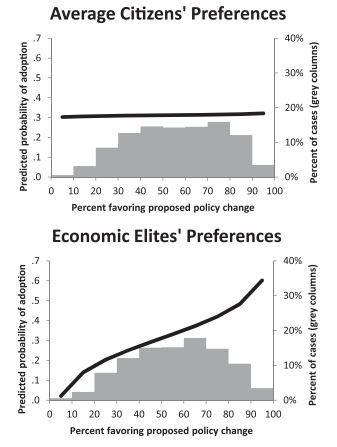
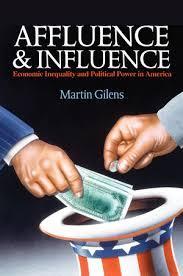 What Martin Gilens has shown, in effect, is that the United States may be a representative democracy in the technical sense but it is by no means an actual, functioning democracy. This is because government policies in our country do not reflect the preferences of the majority; rather, they reflect the preferences of a tiny economic elite. The term for this sort of arrangement is oligarchy, not democracy. When Gilens’ study was first published, it attracted significant attention in the media. The study is groundbreaking in that it proves through hard data and statistical analysis that the United States is, in fact, ruled by an economic elite. This conclusion, however, is something that most people already know and understand, even without any help from academic researchers. Chomsky makes the same point in Requiem. He also seems to predict that the resulting frustration and resentment could lead to adverse social and political consequences that we are, in fact, witnessing in the age of Donald Trump.
What Martin Gilens has shown, in effect, is that the United States may be a representative democracy in the technical sense but it is by no means an actual, functioning democracy. This is because government policies in our country do not reflect the preferences of the majority; rather, they reflect the preferences of a tiny economic elite. The term for this sort of arrangement is oligarchy, not democracy. When Gilens’ study was first published, it attracted significant attention in the media. The study is groundbreaking in that it proves through hard data and statistical analysis that the United States is, in fact, ruled by an economic elite. This conclusion, however, is something that most people already know and understand, even without any help from academic researchers. Chomsky makes the same point in Requiem. He also seems to predict that the resulting frustration and resentment could lead to adverse social and political consequences that we are, in fact, witnessing in the age of Donald Trump.
And the population knows it. What it has led to is a population that’s angry, frustrated, hates institutions. It’s not acting constructively to try to respond to this. There is popular mobilization and activism, but in very self-destructive directions. It’s taking the form of unfocused anger, attacks on one another, and on vulnerable targets. That’s what happens in cases like this. It is corrosive of social relations, but that’s the point. The point is to make people hate and fear each other, and look out only for themselves, and don’t do anything for anyone else.
The attempt to implement the ideals of democracy and capitalism at the same time leads to a serious contradiction, as mentioned above. While political power remains firmly in the hands of a small group of wealthy elites, the population is constantly told that they are the actual sovereigns who control their own destiny. The gap between dreams and ambitions on the one hand and the frustrating reality on the other hand goes on widening, leading to “unfocused anger” that demagogues are then able to channel towards scapegoats, i.e., religious and ethnic minorities. Trump’s victory in the 2016 elections, along with the rise of the ultra-right and white supremacy, seem to vindicate Chomsky’s analysis.
The disempowerment of ordinary people is evidenced, according to Chomsky, in how Americans feel about paying taxes.
April 15 is kind of a measure, the day you pay your taxes, of how democratic the society is. If a society is really democratic, April 15 would be a day of celebration. It’s a day when the population gets together, decides to fund the programs and activities that they have formulated and agreed upon. What could be better than that? So, you should celebrate it. It’s not the way it is in the United States. It’s a day of mourning. It’s a day in which some alien power that has nothing to do with you, is coming down to steal our hard-earned money, and you do everything you can to keep them from doing it. That is a kind of measure of the extent to which, at least in popular consciousness, democracy is actually functioning.
In an actual, functioning democracy, the general population will have control over how their tax dollars are spent. Americans hate paying taxes because they know, deep down, that they have no control over policy-making. They don’t see government as a manifestation of their own will, which would be the case in a real democracy, but as an alien entity that is more or less completely unresponsive to their needs and preferences. This is another way of saying that the ruling classes in the United States have successfully marginalized the population, and that they have done so as a matter of conscious policy.
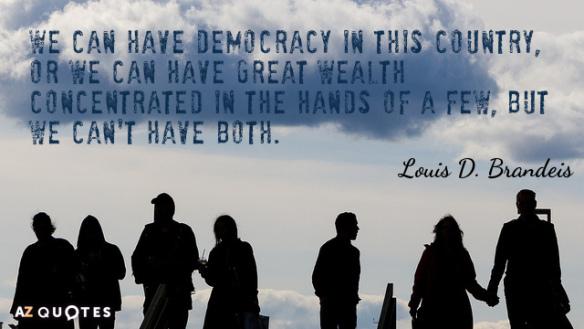
The consequences are hardly surprising: When people lack any actual power to affect policy, they often show a tendency to become increasingly selfish, deciding that they must live according to the maxim “every man for himself.” But human beings can only flourish through cooperation and mutual goodwill. A society that’s based on the pursuit of narrowly defined self-interest will only destroy everything that comes in its path, and will eventually destroy itself.
The tendencies that we’ve been describing within American society, unless they’re reversed, it’s going to be an extremely ugly society. I mean, a society that’s based on Adam Smith’s vile maxim “all for myself, nothing for anyone else,”a society in which normal human instincts and emotion of sympathy, solidarity, mutual support … [are] driven out. … If the society is based on control by private wealth, it will reflect the values that it, in fact, does reflect. The value that is greed, and the desire to maximize personal gain, at the expense of others. Now … a small society based on that principle is ugly, but it can survive. A global society based on that principle is headed for massive destruction.

